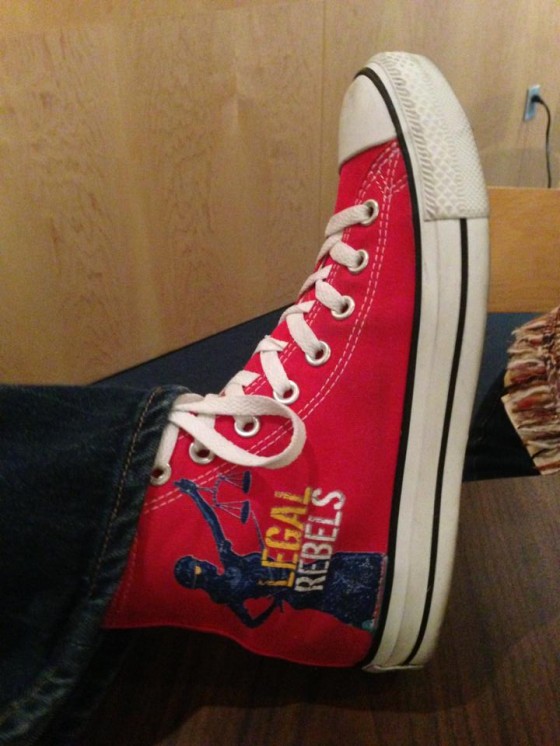
Rockin’ my Magic Red Chucks at the Changing Hands Indie Author Conference – Photo by Jeff Moriarty (used with permission)
I had the pleasure of speaking at the Changing Hands Indie Author Conference over the weekend. It was a day packed with sessions for indie authors and aspiring indie authors on how to publish and market a book. I did two sessions called “Legally Speaking” on how copyright applies to book writers. Here are the top 10 highlights from my presentation and the audience’s questions.
1. You have copyright rights in your work the moment your ideas are captured in any tangible medium (paper, computer file, etc.). You still have your rights even if you forget to put a copyright notice in your book.
2. Having a copyright gives you the exclusive right to copy, display, distribute, perform, and make derivative works based on your work. These rights last for the duration of your life, plus 70 years if your work was created after January 1, 1978.
3. You don’t have to register your copyright with the U.S. Copyright Office to get your rights. You do have to register if you want to sue for infringement.
4. You should submit you application to register the copyright in your book before you make it available for sale.
5. If you live in a community property state (like Arizona), copyrights acquired during the marriage are community property unless you have a prenuptial agreement or spousal agreement that states otherwise.
6. Make sure you understand the difference between a copyright assignment and a copyright license. In the former, you give away your copyright rights; in the latter you retain copyright ownership but grant someone permission to use some of your rights.
7. If you are incorporating other works, characters from existing works, or trademarked products, consult an attorney to make sure you understand what legal risks you’re taking with your project.
8. You will need works made for hire contracts or copyright assignments for artists who contribute to your book (i.e., illustrations, graphics, forward or afterward by another writer, cover art) to give you the copyright in what they create. Consider adding a provision to the contract that states the contributor indemnifies you if you’re accused of copyright infringement because of their contribution.
9. When you create a budget for your book, plan to pay for a lawyer for a few hours to draft or review your contracts. Use a copyright lawyer, not your lawyer buddy who specializes in personal injury law.
10. If you have a publisher, read your contracts carefully to make sure you understand what rights you’re giving up (if any) and how and when you’ll be paid. Don’t sign anything you don’t understand because you’ll probably be stuck with the contract as long as it’s not illegal. Never be afraid to ask for clarification.
If you want to chat more about this topic, please can connected with me on Twitter, Facebook, YouTube, LinkedIn, or you can email me. You can also subscribe to the Carter Law Firm newsletter.
Please visit my homepage for more information about Carter Law Firm.

